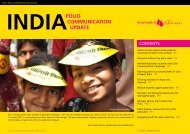Independent Monitoring Board - Global Polio Eradication Initiative
Independent Monitoring Board - Global Polio Eradication Initiative
Independent Monitoring Board - Global Polio Eradication Initiative
- No tags were found...
You also want an ePaper? Increase the reach of your titles
YUMPU automatically turns print PDFs into web optimized ePapers that Google loves.
AT A GLANCEMany of the cancelled campaigns were due to take place in West and CentralAfrica. While polio continues to circulate in northern Nigeria (and recently circulationhas not just continued, but increased), these countries are at significant risk ofinfection. History demonstrates this. Between 2006 and 2010, 20 African countrieswere infected by polio virus derived from Nigeria. Yet campaigns have beencancelled in the majority of these vulnerable countries (figure 4).Campaign cuts will exposean entire band of West andCentral Africa to great riskPlanning was done knowing that funding would be tight. No extraneouscampaigns were planned. If the GPEI now cannot conduct the requiredcampaigns that are needed, this puts the entire goal at terrible risk. An outbreakbecomes much more likely. Besides their immediate impact, outbreaks createfurther expense, divert the attention of programme staff, and are demotivating.And so the Programme slips back.These campaigns were notarranged as optional extras;they are essentialCancelled campaigns are the most visible concern, but the repercussions of afunding shortfall run deeper than this. It creates strain across the Programme.Recruitment of much-needed staff is delayed. Considerable time is diverted tochasing cash flow. Financial shortfall has multiple minor effects that add up to asignificant impact on performance.The finance gap strikes beyondcancelled campaigns; it impairsthe Programme extensivelyThere are complex longstanding issues with the funding of polio eradication,which have not been openly discussed: who should be paying for the <strong>Eradication</strong>Programme? The Programme receives financial support from only a minority ofthe governments that signed up to it, and whose citizens will ultimately sharethe benefit of this global good. Amongst the richest countries of the world,contributions are not commensurate with what is required to complete the task.The immediate problem needs to be rapidly resolved: allowing the African campaignsto be cancelled is foolhardy. But the Programme also needs a more permanent solutionto its state of chronic under-funding. It cannot hope to stop transmission and reacheradication by limping forward from one funding crisis to the next.Allowing the campaigns toremain cancelled is not justrisky, it is foolhardyWe recommend an emergency meeting of the <strong>Global</strong> <strong>Polio</strong> Partners Groupwith one item on the agenda: how to resolve the financial shortfall that isjeopardizing the Programme, such that i) the cancelled campaigns can bereinstated, and ii) the Programme has the required funding to capitalize onthe golden opportunity that it now has, rather than this being squandered.2. The Programme has embarked upon a transformation of its managementapproach; this transformation needs to be vigorously continued.Our previous reports have criticised several aspects of the <strong>Global</strong> Programme’smanagement. Clearly, a programme that can reduce the global incidence of polioby 99% is an impressive operation. Stopping transmission in over 100 countries isno small feat. We deeply respect this. But this is not the aim. The aim is to reach100%, and on that count the Programme has not been fit for purpose.The leap from 99% to 100%eradication has long provedelusive16<strong>Independent</strong> <strong>Monitoring</strong> <strong>Board</strong> of the <strong>Global</strong> <strong>Polio</strong> <strong>Eradication</strong> <strong>Initiative</strong> Every Missed Child




